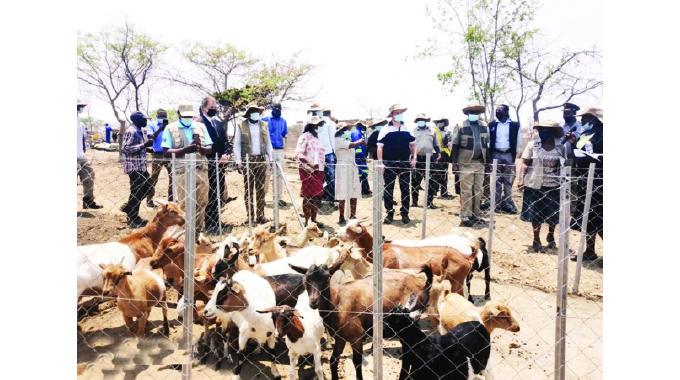Boost for Rushinga goat initiative

The Herald
15/11/2021
Fungai Lupande-Mash Central Bureau
The Rushinga Goat Improvement Centre is set to maintain value for money by removing middlemen who were ripping off livestock farmers on sales, walking away with a lion’s share.
Middlemen would pocket up to 55 percent of the share value, leaving only 17 percent to the farmer.
Lands, Agriculture, Water, Fisheries and Rural Development Deputy Minister Cde Vangelis Haritatos, who officially opened the centre last week, was impressed by the organised meat market, on-farm feed production, vaccination and drug supply, dip tanks, breeding and genetic improvement pens.
He said the Second Republic was cognisant of challenges faced by small and medium scale goat producers despite great potential within the sub sector to contribute towards economic growth, resilient and sustainable agriculture.
“To this end, Government has launched the livestock development plan with a priority on animal nutrition, genetic improvement, animal health and market development,” said Deputy Minister Haritatos.
“I am thrilled to realise that there are 12 such goat improvement centres across the country aimed at promoting on-farm feed formulation, creation of livestock business centres and production of livestock inputs and veterinary vaccines and medicines.”
This, he said, was in line with key livestock growth targets within the National Development Strategy 1.
Deputy Minsiter Haritatos said farmers could achieve more within a short space of time by working together in organised groups.
Action Aid Zimbabwe country director and value project steering committee chairperson Mr Joy Mabenge said a study revealed that the goat sub-sector was among the least in priority at policy level.
He said findings indicated that most small to medium scale goat producers did not belong to any formal group, making it difficult to bargain or address challenges.
Mr Mabenge said some of the challenges included middlemen who ripped off goat producers.
“Armed with this knowledge, we set out to intervene and organise goat producers into business associations and to date 70 percent of 10 000 registered farmers affiliated to the 12 district goat producer business associations,” he said.
“We sought to inject new genetics into goat production to address the challenges brought by tired genetics and in-breeding. We imported a total of 312 boer, sannen, toggenburg and Kalahari red goat breeding stock from Namibia.”
Mr Mabenge said farmers had gained control of the value chain and market to increase profit margins. He said on-farm feed production reduced the cost of inputs by US$11 per bag.
He called on the Government to intervene and address the continued predation of the livestock by wildlife, unreliable water source and reduced grazing land and pastures and lack of funding.
Mashonaland Central Minister of State for Provincial Affairs and Devolution Senator Monica Mavhunga, said the Second Republic was moving with speed in implementing people-centred projects.
“For a long time, goat producers in Rushinga were ripped off by middlemen,” she said. “The district has a large herd of goats, but they were of no benefit to the local people.
“The province tops in small ruminant production and we are happy that it is now paying dividend to our goat producers. Our province is also outstandingly good in traditional grain production.”
The programme was supported by the European Union and their team leader Mr Bernard De Schrevel said he was still new in the country, but was happy with the progress coming from the money they provided.
He commended the Government’s Emergency Road Rehabilitation Programme, saying the roads leading to Rushinga were excellent.
“I am still in the learning mode,” said Mr Schrevel. “We are in the new programming phase and we are responding positively to the Government request to fund future programmes. On our way here, I noticed that the roads are excellent. It’s a pleasure to come here.”
